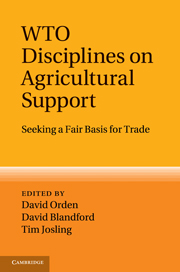Book contents
- Frontmatter
- Contents
- List of figures
- List of tables
- Notes on contributors
- Preface
- List of acronyms
- PART I overview of domestic support issues and WTO rules
- PART II Developed countries: have high levels of support come down?
- 3 European Union
- 4 United States
- 5 Japan
- 6 Norway
- PART III Developing countries: will low levels of support rise?
- PART IV Looking forward: can fair markets be achieved?
- Appendix A Domestic support provisions of the Agreement on Agriculture
- Appendix B Domestic support provisions of the Doha draft modalities
- Index
- References
5 - Japan
Published online by Cambridge University Press: 11 April 2011
- Frontmatter
- Contents
- List of figures
- List of tables
- Notes on contributors
- Preface
- List of acronyms
- PART I overview of domestic support issues and WTO rules
- PART II Developed countries: have high levels of support come down?
- 3 European Union
- 4 United States
- 5 Japan
- 6 Norway
- PART III Developing countries: will low levels of support rise?
- PART IV Looking forward: can fair markets be achieved?
- Appendix A Domestic support provisions of the Agreement on Agriculture
- Appendix B Domestic support provisions of the Doha draft modalities
- Index
- References
Summary
Japan's general approach toward agricultural domestic policy reform is one of strict compliance with the domestic support disciplines of the WTO. Japan reduced its AMS support by nearly 80 percent between 1995 and 2000. As a result, by 2000 its Current Total AMS had declined to less than 20 percent of its commitment under the Agreement. Japan launched an extensive agricultural subsidy reform in 2007 that partly reflected the principle of decoupling. An additional expansion of direct payments to farmers, the categorization of which will have to be taken into account in the future, was proposed in 2009 after a shift in control of the government.
This seemingly accommodating attitude on domestic agricultural policy contrasts with a less flexible attitude on border protection for agricultural commodities. Japan's nominal protection rate for agriculture is one of the highest among developed nations. Japan, which is surrounded by the ocean and poorly endowed with natural resources, relies heavily on trade. Nevertheless, its strong resistance to reductions in agricultural border protection has repeatedly hindered trade negotiations with other countries. During the Uruguay Round negotiations, Japan lobbied hard to maintain its rice autarky policy. An inflexible stance on rice imports almost resulted in Japan's failure to join the final agreements.
In consideration of this background, this chapter provides a comprehensive picture of Japan's agricultural policy. Farmland regulations are often manipulated in Japan, bringing financial benefits to farmland owners.
- Type
- Chapter
- Information
- WTO Disciplines on Agricultural SupportSeeking a Fair Basis for Trade, pp. 153 - 188Publisher: Cambridge University PressPrint publication year: 2011
References
- 2
- Cited by



